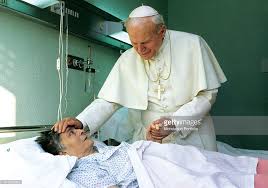Treatment of Love
Our Mission
We offer a special spiritual care ministry for those who suffer from the “Illness of the Human Mind” St. John Paul II
 “I was sick and you visited me.”
“I was sick and you visited me.”
(Mt. 25:36)
The Treatment of Love- Our Special Spiritual Care
Dolentium Hominum -Personal Concern
Church and Health in the World, No. 34 Year XII, 1997 No.1
Reflections from the Proceedings of the Eleventh International Conference organized by the Pontifical Council for Pastoral Assistance to Healthcare Workers
“In The Image and Likeness of God: Always?” Disturbances of the Human Mind
Nov 28. 29-30, 1996 at Paul VI Hall, Vatican City
- Cardinal Angelini’s Words of Greeting for the Holy Father (St. Pope John Paul II)
- The Mentally Ill Are Also Made in God’s Image, The Holy Father’s Address
- Introductory Remarks: A New Attitude Towards the Mentally Ill, Cardinal Fiorenzo Angelini
- Opening Address: The Likeness of God in the Human Being, Cardinal Joseph Ratzinger (Pope Emeritus Benedict XVI- honorably discharged from his position but retaining his former title)
Timothy’s Reflection on four of the fifty-three conference addresses
This conference spoke of a “new milestone on the road of research, analysis, reflection and practical conclusions”,(Cardinal Angelini) for the problem of mental illness in connection with concern of the sanctity of human life and the dignity of the human person.
St. John Paul II addresses the conference addressing his personal reflection on the first chapter from the letter of St. Paul to the Ephesians calling us “to live in the Praise of God’s Glory”. (Eph.1:6) Our beloved pontiff reminds everyone that a person’s dignity is due to the fact that they are made in “God’s image and likeness.” (Gen 1:26) Saint John Paul II adds the word “always” in reference to those who have some form of mental illness or brain disorder. When a person’s mental facilities have been interrupted because of illness, they are not a deformed image of God. St. John Paul then calls everyone to a treatment of love for those who suffer from the “illness of the human mind.” (St John Paul II, Holy Father’s Address)
“One of the most serious problems in the treatment and care of the mentally ill lies in their presence in families, which on their own are not able to help their afflicted relatives without risk and in an adequate fashion. Even the modern facilities end up being like infamous lunatic asylums when the human heart is lacking.” (Cardinal Angelini, A New Attitude Towards the Mentally Ill)
The relationship of the mentally ill person to God
Mental Suffering in the will of God- A Call to Holiness
 Timothy Duff, STM, NACC board certified chaplain
Timothy Duff, STM, NACC board certified chaplain
“There are a great many people who believe that the canonized saints were never neurotic, never depressed, never suffered from scrupulosity, never mentally or emotionally ill. These people hold on to their belief that the saints experienced spiritual sufferings "dark nights of the soul", had cancer, TB, heart trouble and broken'
bones; but never nervous breakdowns, never shattered minds. Are these good people correct in their thinking; belief? No; they are, in fact, very far from the actual truth as we shall presently see. The saints were wholly and truly human, and many of them, just because they were human, had serious mental problems, psychological sufferings, such as one today might expect to find in psychiatric case histories.” (Laruffa 1998)
The above quote came from a booklet, Neurosis and Sanctity by Joseph Laruffa which was sent to us a while ago by one of our members. Since the beginning of the founding the Guild, I have always been pondering the question: Can someone who is mentally ill become a saint? The answer is Yes! In fact, they are living out their vocation of mental and emotional suffering. Although, Christ did not suffer mental illness, he took on all human suffering to redeem it. He identified himself with those with mental suffering as to be an example of love. He experienced a mental agony in the Garden of Gethsemane which caused him to sweat blood. I often advise people to meditate on this fact when I am offering support as a chaplain. The aloneness that Christ experienced can be a great sign of hope. This holds true especially for those with depression and other emotional difficulties. Notice in the image of Christ; he is surrounded by the crown of thorns. Mental illness and brain disorders affect the whole person.
Through our love of compassion, (our hearts of flesh) we bring “the one comfort” to Jesus suffering today in the mentally ill. This is the “Treatment of Love” that St John Paul speaks of. We can stand in for them by our prayers and presence. We are their spiritual support. Many people with mental illness have great moral courage in dealing with the challenges that come with the illness. The side effects of medication make it difficult. But one can take their medication in a spirit of love with Christ and know that He is with them. This gives them the opportunity to share in the redemptive suffering of Christ and to grow in holiness.
St. Benedict Joseph Labre- The Model of Love
Joseph Laruffa writes: “St. Benedict Joseph Labre, Rome's beggar, called "the great unwashed," was a neurotic derelict, who experienced mental depression to a painful degree. It wasn't just "the blues"; it was "black depression," writes his biographer.” Carol Houselander in her book Guilt states: “the life of Benedict Joseph Labre illustrates that way in which God sometimes uses neurosis to lead a man whose will is surrended to him, into a vocation which he would not even imagine for himself...No sooner had Labre understood what it was that he was to do, then his mental condition was cured. He had no idea of the whole meaning of his life, of how many millions he stood proxy for before God, of the enormous burden of mental suffering that was sanctified in his own; but from the moment he became a wondering beggar his mind was illuminated and filled with peace, which remained with him through all of his outward sufferings until, like so many of those for whom he had come to be a Christ, he died from exhaustion in the crowded streets.” St. Benedict Joseph Labre was truly the personification of the rejected suffering Christ.
The Treatment of Love and the Family
We are in solidarity with those families who share the pain and chaos of brain disorders and mental illness. We offer our presence and support. This is the reason my mother and I founded MMOMI prayer groups. The focus of these groups is to provide support for a family with a loved one suffering with brain disorders and mental illness. The groups have been very successful. Over the years we had more than the few groups in different cities county. In fact, once the groups began, attendees would travel great distances. The groups ran for over ten years in some locations.
These unique groups offer spiritual support in a way that offers hope, healing and comfort. The groups are organized as a sacred space to allow for prayer, sharing, education and spiritual advocacy. Tim reflects on the teachings of St. Pope John Paul II’s - Dolentum Hominum which is written as concern for pastoral care to the sick. We support our reflections through a bulletin called Under Her Mantle.
We realize the spiritual needs of these holy people and the gap that exists in our Church to address the needs of families who suffer with mental illness. Our great wish is to see a new spiritual movement of prayer and support for those with brain disorders and all types of mental and emotional illness.
I’d be happy to answer any questions for you as well as speak to you about our devotion to the Merciful Mother of the Mentally Ill. I look forward to hearing from you at any time.
Email me: guildbjlabre@gmail.com cell 617-412-0691
The Treatment of Love in the Parish
Over the years, a few parishes have asked us for help in developing ministries for those with brain disorders and mental illnesses, including their families and friends. The Universal Church has expressed the concern for those with mental illness but the local parishes are left with asking the question: How do we serve this population?
Here are some of our suggestions for the Treatment of Love:
- Offer a regular Mass and Healing Prayer Service – In our experience, these liturgical practices have been sacred moments of healing for those we serve. At these events, actual miracles of healing and comfort have been experienced by the families in profound ways.
- We suggest having a MMOMI group in your parish. More can be found about these groups on our website.
- Place our brochures in your parishes to help us share our ministry.
Again, I’d be happy to answer any questions for your parish. I look forward to hearing from you at any time. Email me: guildbjlabre@gmail.com cell 617-412-0691